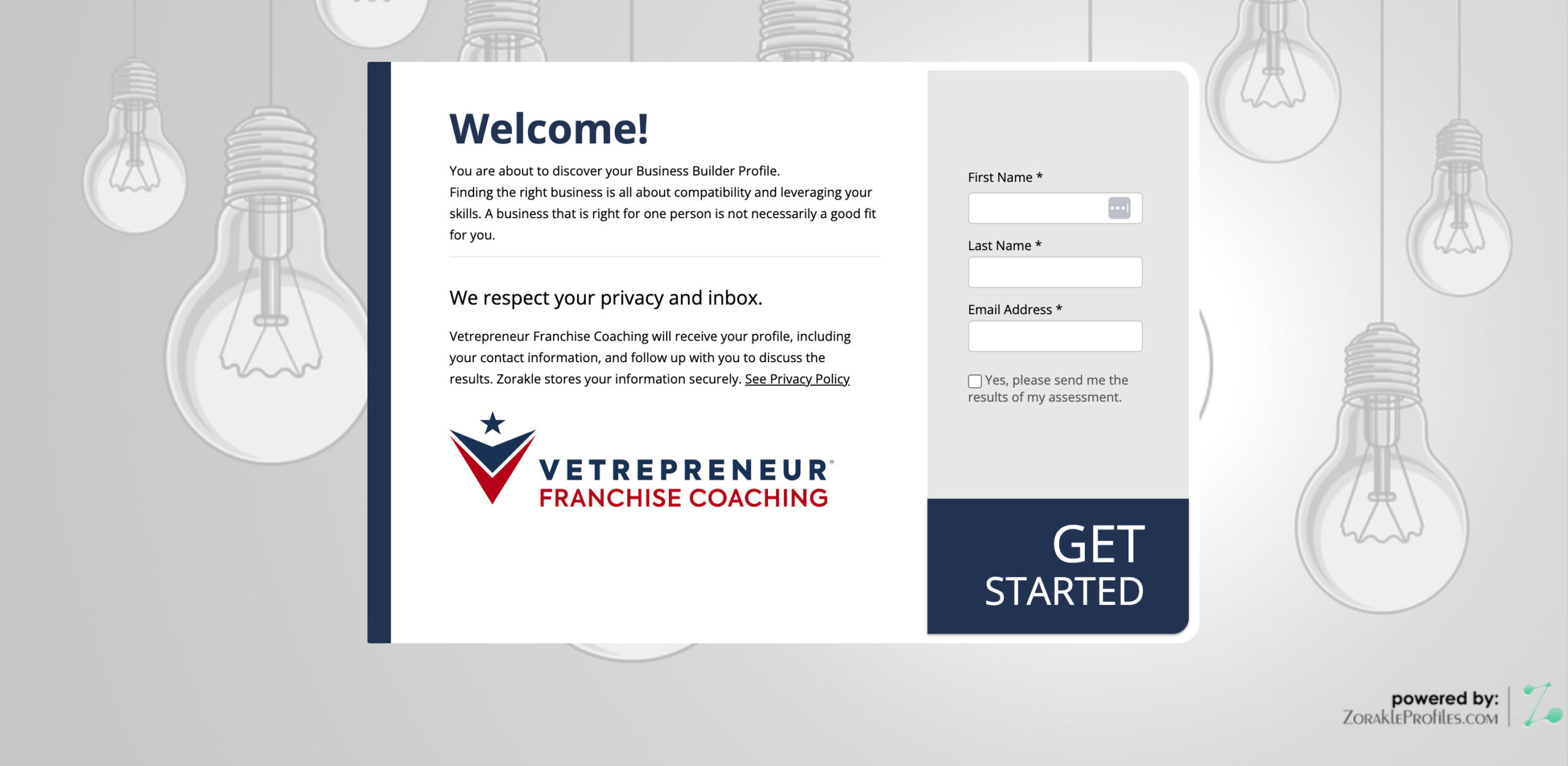
Step 2 - Self Assessment
Congratulations! You’ve pre-qualified for franchising. Now it’s time to start digging deeper into who you are and the types of franchising sectors to help us find the right fit. A thorough self-assessment prepares you for a product Discovery Meeting with your Senior Coach.
There is no data collected or stored with the use of this Franchise Calculator. We recommend when interacting with the Franchise Calculator you are in a secure location for your security. Our Information Security and Development teams continuously monitor our Franchise Calculator to ensure there is no data being captured. All usage of the calculator is voluntary.
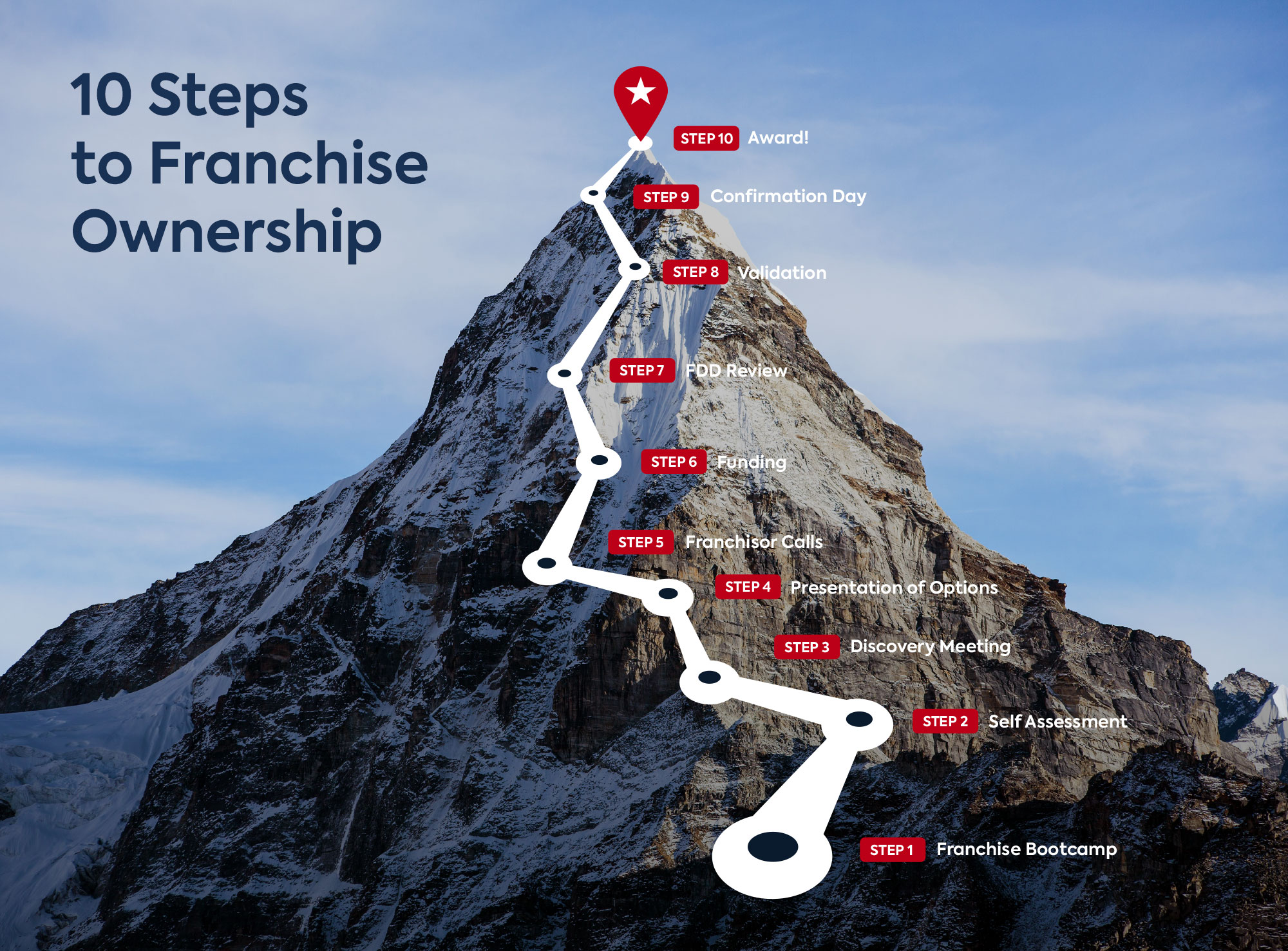
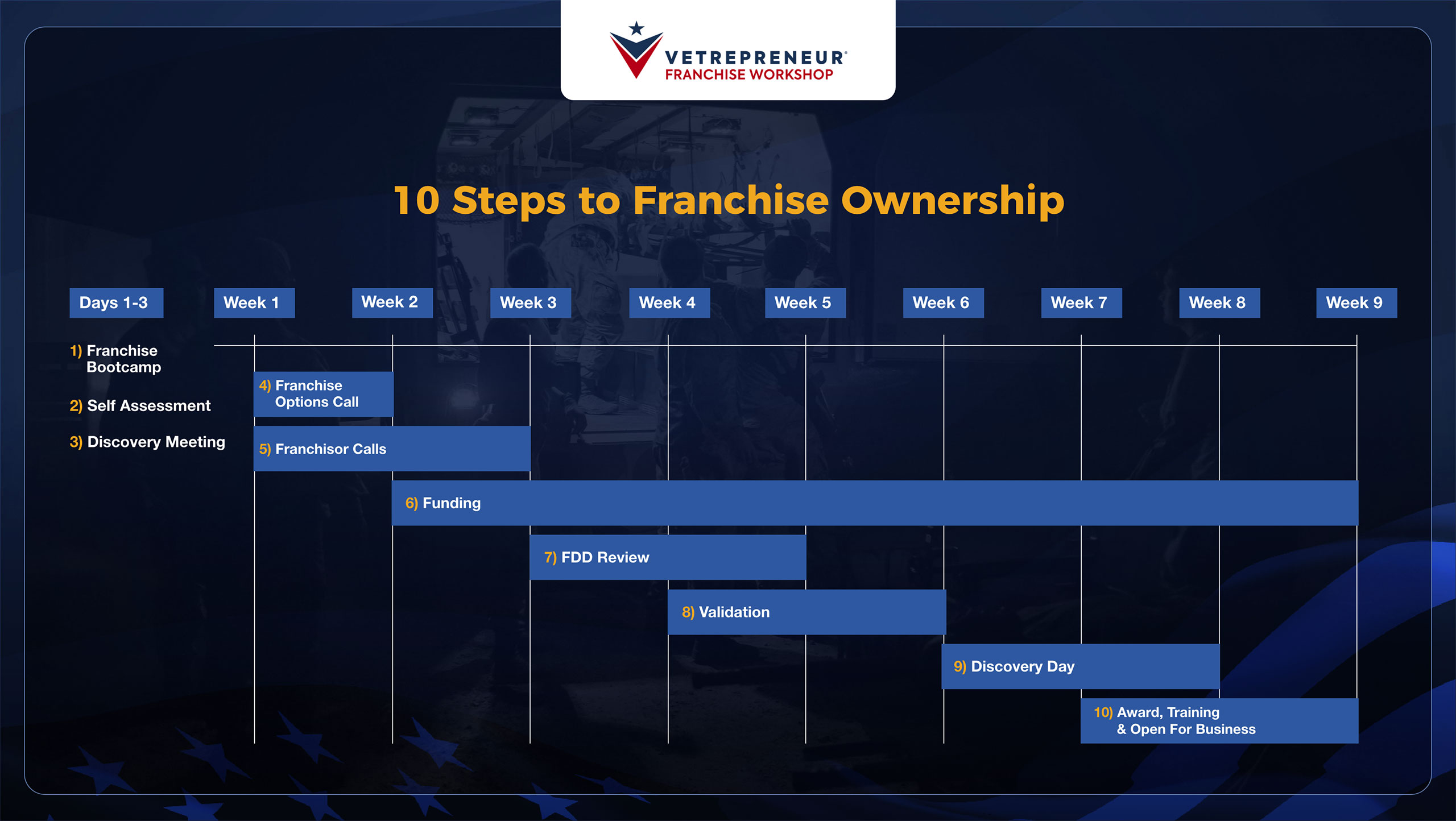 *The above timeline is a basic estimate. Depending on the potential franchisee, the franchisor and many other factors, the timing can be different from person to person.
*The above timeline is a basic estimate. Depending on the potential franchisee, the franchisor and many other factors, the timing can be different from person to person.What You’ll Gain
- Preparation for your Discovery Meeting with your Franchise Coach
- Understanding of the 10 Steps to Franchise Ownership
- Understanding of basic franchise industry types
- Completed Franchise assessment profile
- Ability to calculate your net worth
- Understanding the basic timeline to being awarded your own franchise
Required Tasks to Complete
The self-assessment breaks down as follows:
Finding the right business is all about compatibility and leveraging your skills. Please complete your Business Builder Profile by clicking here before your Discovery Call with your coach.
Select the “Calculate Your Net Worth” tab above and fill in the spaces provided. To summarize, subtract your total liabilities from your total assets. Your assets include savings, investments, cash deposits and any equity you have in your home, car or similar assets. Your liabilities would include any debt such as loans, credit cards, student loans, etc.
Read below under “Assess Your Franchise Industry Preferences”. We’ll walk you through the 10 basic franchise industry types and have you give an initial rating on each of them. This helps you understand the full scope of franchise options available and helps your coach in the matching process.
When Will I Get to Speak With My Franchise Coach?
If you haven’t already scheduled your Discovery Call with your Coach, monitor your email. An email will be sent with a link.
During your Discovery Call, we recommend using a laptop or desktop computer as we’ll be meeting through video on Google Meet.
It’s important you come to your meeting with your coach prepared. Please show up with these items completed.
1) Business Builder Profile from Zorakle Profiles (Link)
2) Basic calculation of your net worth
3) Assess franchise industry preferences. Have an idea of the types of franchises you may want to pursue.
4) Please review the Franchise Bootcamp video from Step 1.
It’s important to come to the Discover Meeting with a basic understanding of franchising to make your time meaningful. This one hour casual conversation with one of our Coaches is to determine your skills, lifestyle, finances and location and how those line up with thousands of franchise opportunities.
Assess Your Franchise Industry Preferences
We’ll walk you through each of the ten franchise industry types with a brief description.
Oil changes, mufflers, brakes, tires and accessorizing. Retail location. Generally high fixed and variable costs. Automotive is ideal for growing areas where these existing services don’t exist yet.
Many people who are new to franchising or ate at the “franchise buffet” come to us and want to open a Chick-fil-A, Subway, Buffalo Wild Wings or whatever their favorite restaurant is. Hey, I like to eat at those places like everyone else. And for a chosen few, those may be good options. But for the vast majority of us…

1. Franchising includes home services, senior care, pet care, child services, gyms, beauty salons and so much more. These are great businesses and, more importantly, finding your perfect match can only happen if you start by looking at the full menu.

2. A successful franchise owner is one who understands the unique role that only they can play. You have three primary jobs as a franchise owner. Lead your employees, exceed your customers’s expectations and manage the business. Notice that all three of these jobs are agnostic of the product or service you are selling. Your job is not to make the product or provide the service. And it certainly isn’t eating the product! The franchisor will teach you and train you on what you need to know about the product and service. A franchise owner who does those three things well will be successful in any industry.
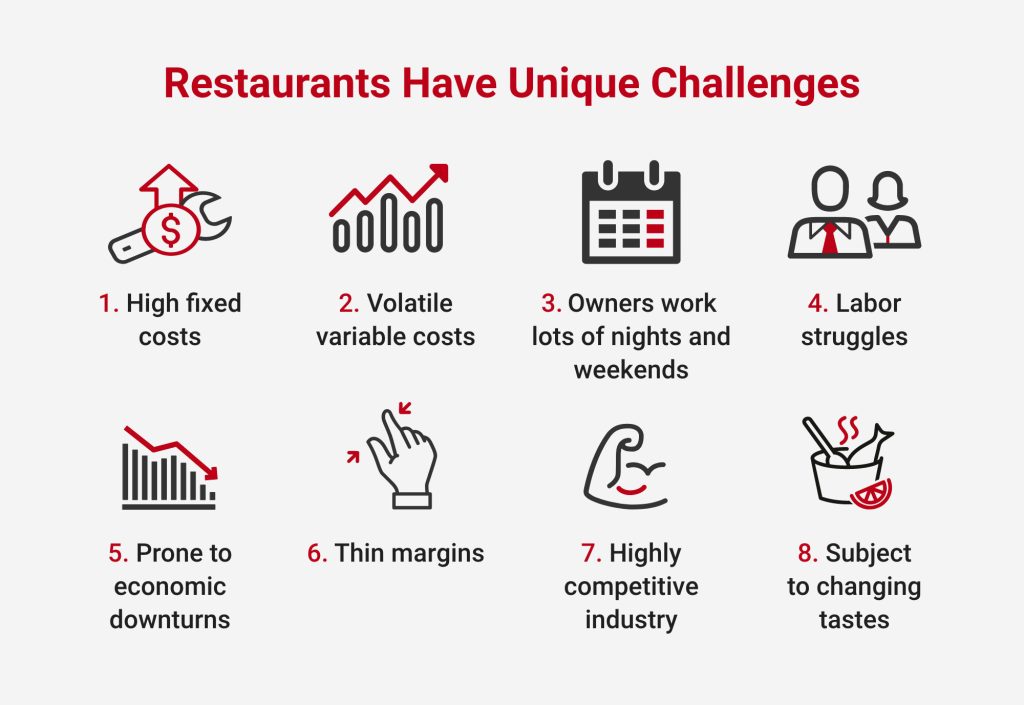
3. Restaurants have high fixed costs, high and volatile variable costs, disrupted supply chains, and your product has a shelf life so you’ll have waste. Restaurants require owners to be physically present or you must have a very highly trusted on-site manager. Theft, especially with employees, is common. Owners typically work nights and weekends when customers want to eat out. All industries struggle to recruit and retain workers these days but restaurants are especially challenged. Eating out is usually one of the first things consumers cut back on when the economy turns south. And finally, your business is subject to high levels of competition which are constantly bringing new concepts and product innovations to win over your customers.
When we recommend food & beverage, we prefer to find those with simple menus, lower costs and those which prioritize automation, take-out and delivery.
In the end, restaurants are great for the right person. But most people aren’t right for restaurants.
Lashes are big right now. Hair always is, although it was much bigger in the 80s:) Spas and anti-aging salons are big business, and with growing disposable income and a desire to treat ourselves, these categories are poised for high growth. As with any retail location, you’ll have higher fixed costs and you’ll likely be open on nights and weekends. But unlike food, your variable costs are usually very low. Labor is your primary variable cost but you can simply add more workers as demand grows.
Veterans are familiar with fitness. It’s part of military life. There are two types of fitness franchises: gyms and in-home personal training.
Gyms involve a retail location, which means a higher fixed cost than home-based businesses. On the high end, you’ll need to buy a bunch of cardio or weight-bearing machines to fill the gym. On the lower end, you’ll have mats and mirrors for yoga, pilates or stretching. Gyms benefit from recurring membership revenues but also struggle with renewals and are subject to constantly changing fitness trends.
In-home personal training, on the other hand, has a near zero fixed cost and enables the gig economy by enabling personal trainers to work when they want. In-home personal training franchises leverage the growing disposable income, health awareness, in-home fitness and desire for individuals to have someone hold them accountable to their fitness goals.
Americans are spending more money on their kids than ever. Kid related franchises include tutoring, sports involvement, STEM immersion and even kids birthday party themes. Since kids franchises tend to be very hands-on, they’re ideal for people who love kids, teaching and coaching.
Selling is the primary duty of a distributorship. Product manufacturers use distributor franchises to sell products to end-users. Typically this involves a unique service that is provided in addition to the product: in-home flooring sales (we come to you) and window installers are successful examples. You’ll typically work pretty normal hours and your focus will be on business development and selling at appointments. These franchises typically have low fixed costs, carry little to no inventory and have higher margins.
B2B means business to business, as opposed to business to consumer (B2C). B2B means you are a business selling to other businesses. Examples of franchises in the B2B category range from blue collar pursuits like parking lot striping, restaurant exhaust duct cleaning, office space cleaning to white collar services like employee drug testing, leadership training, IT and cost reduction. As franchise owner, you’ll do a lot of networking with small and mid-sized businesses in your area to bring in business.
Americans are living longer, have more disposable income and want to stay in their homes. Senior care franchises deliver in-home health care, in-home companion care and referrals to nursing facilities. There are also senior care franchises for running estate sales after seniors leave their homes and others for outfitting senior homes with stairlifts, walk-in baths and other mobility devices. Senior care franchises tend to be home-based so lower fixed and variable costs. Those which deliver medical care are mostly insurance pay. Those which deliver companion care are mostly private pay. There are pros and cons to each.
Seems like everyone got a dog or cat during the pandemic. Pet ownership is at historic highs and pet owners have the disposable income to pay someone to train, walk, board and groom their dog. There are even franchises for cleaning up the dog poop in your yard! Pet franchises enjoy multple revenue streams and strong recurring revenues. Many are home-based, which have lower entry and fixed costs. But doggy day care facilities are a huge business if you have the capital to get into them.
We saved the biggest and one of the most attractive categories for last!
A generation ago, people spent their weekends doing cleaning, household maintenance, landscaping or tending to honey-do lists. Nowadays, we spend our weekends in leisure activities or carting kids around to 91 different sports activities. We work hard all week and don’t want to work all weekend. And we have the disposable income to hire someone else to do all that other stuff we used to ourselves!
Home services franchises exist to do the work that consumers either don’t want to do, don’t have the time to do or can’t do. And. It’s. Booming!
Your typical home services franchise involves wrapping a van or truck, fill it with a technician and some tools and go into peoples’ homes. The fixed and variable costs are much lower than a retail location and you can control them by only adding as demand grows.
In most home services franchises, you’ll work normal hours and will often benefit from recurring revenues and referrals from satisfied customers. Home services tends to be recession-proof because people will cut many other expenses in their lives before they go back to doing things they don’t like to do!
Since workers and technicians in home services are more skilled, and hence paid more, you won’t struggle with labor access as much as lower paid, unskilled labor. Worried about training your employees to do the work? In most cases, the franchisor will help with that.
If you want to scale and grow, home services allows two ways to do that. The first is growing horizontally by providing the same services across a larger geographical territory. The second is by stacking multiple services on the same geographical territory. Those same households that need cleaning services also need repair, maintenance and trades!
Home services franchises include four main areas: Cleaning, Maintenance, Repair and Trades.
There are franchises for residential home cleaning, pool cleaning, powerwashing, auto detailing and even cleaning your dryer vent. Cleaning also includes junk removal and restoration services, which is clean-up after water or fire damage.
Maintenance include painting, pest control, lawn care and handyman services.
There are franchises to repair cracked driveways, windshields and granite countertops. There are franchises that refurbish front doors and repair tears in leather furniture.
Skilled trades include the usual suspects like plumbing, electrical and HVAC. And before you ask, the answer is no. No, you don’t have to have experience in the trades to open a skilled trade franchise. In fact, there are plenty of stories about plumbers who open plumbing businesses and find out they prefer to clear drains or install bathrooms. When they do that as an owner, nobody’s leading employees, meeting customer expectations and managing the business. Keep in mind that your job as a business owner is not to deliver the service!
Ah yes. You remember Monopoly don’t you? Community Chest. The wildcard. There are franchises for crime scene clean-up, art studios, vending, laundromats and more.
- Next Step - Discovery Meeting
Monitor your email. A coach will send an email with a link for you to schedule time on their calendar. We recommend using a laptop or desktop computer as we’ll be meeting through video on Google Meet. This one hour casual conversation with one of our Coaches is to determine your skills, lifestyle, finances and location and how those line up with the thousands of franchise opportunities. Here they will also review your franchise resume and Franchise Business Builder Profile.

Self Assessment
- Congratulations! You’re pre-qualified for franchising.
- A thorough self-assessment prepares you for a productive Discovery Meeting with your Franchise Coach.
Goal
Prepare for your Discovery Call
Step Completion
Calculate Your Net Worth
The numbers displayed below are for illustrative purposes only. You’re welcome to input your own information securely.
NO DATA IS STORED. This tool is solely for calculation purposes.
There is no data collected or stored with the use of this Franchise Calculator. We recommend when interacting with the Franchise Calculator you are in a secure location for your security. Our Information Security and Development teams continuously monitor our Franchise Calculator to ensure there is no data being captured. All usage of the calculator is voluntary.
Assess Your Franchise Industry Preferences
We’ll walk you through each of the ten franchise industry types with a brief description.
Automotive
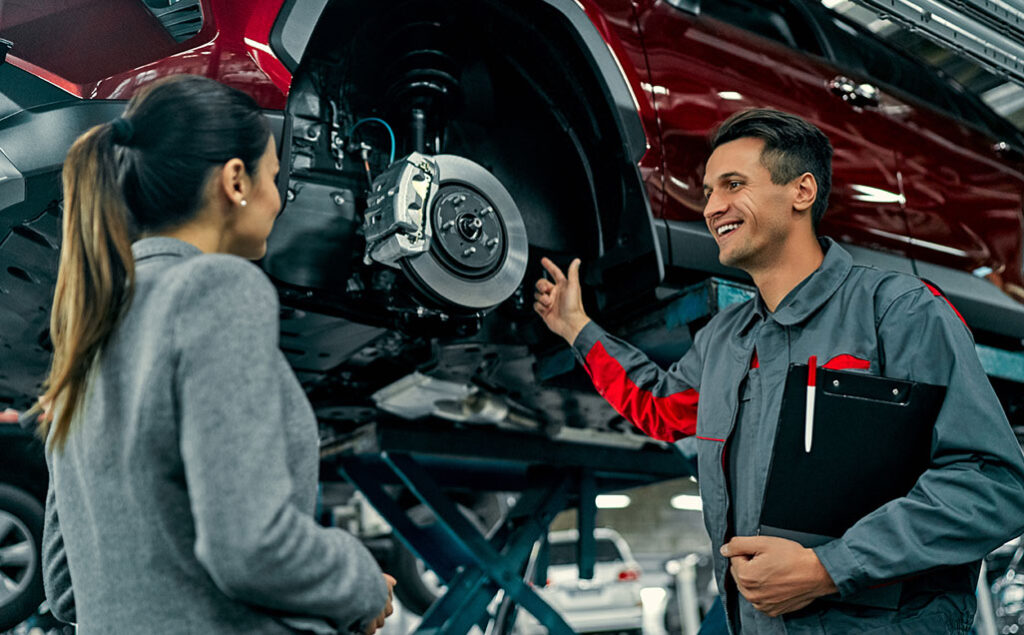
Oil changes, mufflers, brakes, tires and accessorizing. Retail location. Generally high fixed and variable costs. Automotive is ideal for growing areas where these existing services don’t exist yet.
Food & Beverage

Many people who are new to franchising or ate at the “franchise buffet” come to us and want to open a Chick-fil-A, Subway, Buffalo Wild Wings or whatever their favorite restaurant is. Hey, I like to eat at those places like everyone else. And for a chosen few, those may be good options. But for the vast majority of us…

1. Franchising includes home services, senior care, pet care, child services, gyms, beauty salons and so much more. These are great businesses and, more importantly, finding your perfect match can only happen if you start by looking at the full menu.

2. A successful franchise owner is one who understands the unique role that only they can play. You have three primary jobs as a franchise owner. Lead your employees, exceed your customers’s expectations and manage the business. Notice that all three of these jobs are agnostic of the product or service you are selling. Your job is not to make the product or provide the service. And it certainly isn’t eating the product! The franchisor will teach you and train you on what you need to know about the product and service. A franchise owner who does those three things well will be successful in any industry.

3. Restaurants have high fixed costs, high and volatile variable costs, disrupted supply chains, and your product has a shelf life so you’ll have waste. Restaurants require owners to be physically present or you must have a very highly trusted on-site manager. Theft, especially with employees, is common. Owners typically work nights and weekends when customers want to eat out. All industries struggle to recruit and retain workers these days but restaurants are especially challenged. Eating out is usually one of the first things consumers cut back on when the economy turns south. And finally, your business is subject to high levels of competition which are constantly bringing new concepts and product innovations to win over your customers.
When we recommend food & beverage, we prefer to find those with simple menus, lower costs and those which prioritize automation, take-out and delivery.
In the end, restaurants are great for the right person. But most people aren’t right for restaurants.
Health & Beauty

Lashes are big right now. Hair always is, although it was much bigger in the 80s:) Spas and anti-aging salons are big business, and with growing disposable income and a desire to treat ourselves, these categories are poised for high growth. As with any retail location, you’ll have higher fixed costs and you’ll likely be open on nights and weekends. But unlike food, your variable costs are usually very low. Labor is your primary variable cost but you can simply add more workers as demand grows.
Fitness

Veterans are familiar with fitness. It’s part of military life. There are two types of fitness franchises: gyms and in-home personal training.
Gyms involve a retail location, which means a higher fixed cost than home-based businesses. On the high end, you’ll need to buy a bunch of cardio or weight-bearing machines to fill the gym. On the lower end, you’ll have mats and mirrors for yoga, pilates or stretching. Gyms benefit from recurring membership revenues but also struggle with renewals and are subject to constantly changing fitness trends.
In-home personal training, on the other hand, has a near zero fixed cost and enables the gig economy by enabling personal trainers to work when they want. In-home personal training franchises leverage the growing disposable income, health awareness, in-home fitness and desire for individuals to have someone hold them accountable to their fitness goals.
Kids

Americans are spending more money on their kids than ever. Kid related franchises include tutoring, sports involvement, STEM immersion and even kids birthday party themes. Since kids franchises tend to be very hands-on, they’re ideal for people who love kids, teaching and coaching.
Distributorships

Selling is the primary duty of a distributorship. Product manufacturers use distributor franchises to sell products to end-users. Typically this involves a unique service that is provided in addition to the product: in-home flooring sales (we come to you) and window installers are successful examples. You’ll typically work pretty normal hours and your focus will be on business development and selling at appointments. These franchises typically have low fixed costs, carry little to no inventory and have higher margins.
B2B

B2B means business to business, as opposed to business to consumer (B2C). B2B means you are a business selling to other businesses. Examples of franchises in the B2B category range from blue collar pursuits like parking lot striping, restaurant exhaust duct cleaning, office space cleaning to white collar services like employee drug testing, leadership training, IT and cost reduction. As franchise owner, you’ll do a lot of networking with small and mid-sized businesses in your area to bring in business.
Senior Care

Americans are living longer, have more disposable income and want to stay in their homes. Senior care franchises deliver in-home health care, in-home companion care and referrals to nursing facilities. There are also senior care franchises for running estate sales after seniors leave their homes and others for outfitting senior homes with stairlifts, walk-in baths and other mobility devices. Senior care franchises tend to be home-based so lower fixed and variable costs. Those which deliver medical care are mostly insurance pay. Those which deliver companion care are mostly private pay. There are pros and cons to each.
Pet Care

Seems like everyone got a dog or cat during the pandemic. Pet ownership is at historic highs and pet owners have the disposable income to pay someone to train, walk, board and groom their dog. There are even franchises for cleaning up the dog poop in your yard! Pet franchises enjoy multple revenue streams and strong recurring revenues. Many are home-based, which have lower entry and fixed costs. But doggy day care facilities are a huge business if you have the capital to get into them.
Home Services
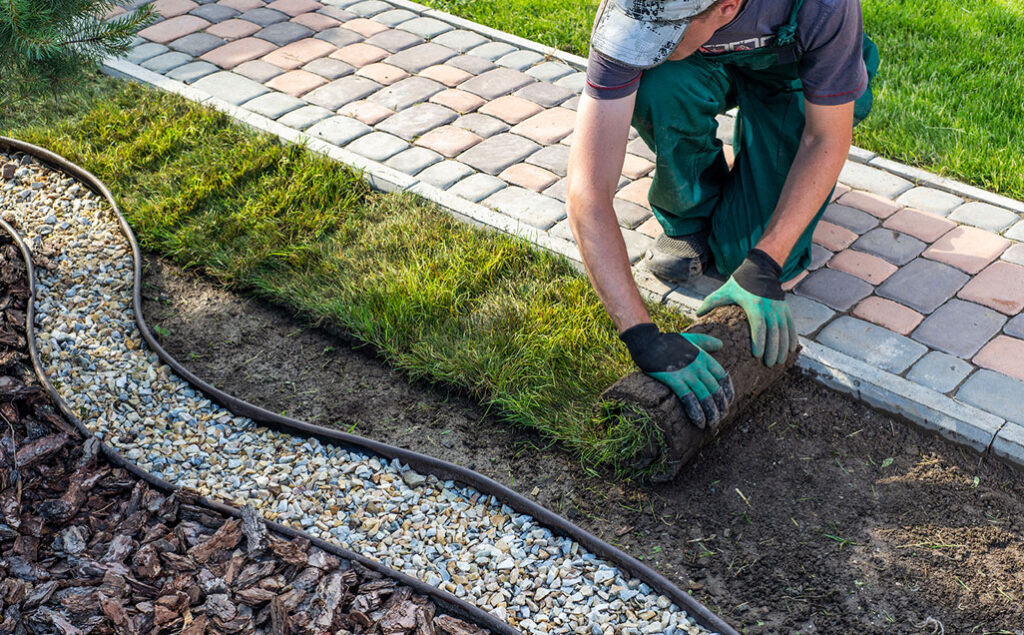
We saved the biggest and one of the most attractive categories for last!
A generation ago, people spent their weekends doing cleaning, household maintenance, landscaping or tending to honey-do lists. Nowadays, we spend our weekends in leisure activities or carting kids around to 91 different sports activities. We work hard all week and don’t want to work all weekend. And we have the disposable income to hire someone else to do all that other stuff we used to ourselves!
Home services franchises exist to do the work that consumers either don’t want to do, don’t have the time to do or can’t do. And. It’s. Booming!
Your typical home services franchise involves wrapping a van or truck, fill it with a technician and some tools and go into peoples’ homes. The fixed and variable costs are much lower than a retail location and you can control them by only adding as demand grows.
In most home services franchises, you’ll work normal hours and will often benefit from recurring revenues and referrals from satisfied customers. Home services tends to be recession-proof because people will cut many other expenses in their lives before they go back to doing things they don’t like to do!
Since workers and technicians in home services are more skilled, and hence paid more, you won’t struggle with labor access as much as lower paid, unskilled labor. Worried about training your employees to do the work? In most cases, the franchisor will help with that.
If you want to scale and grow, home services allows two ways to do that. The first is growing horizontally by providing the same services across a larger geographical territory. The second is by stacking multiple services on the same geographical territory. Those same households that need cleaning services also need repair, maintenance and trades!
Home services franchises include four main areas: Cleaning, Maintenance, Repair and Trades.
Home Services - Cleaning

There are franchises for residential home cleaning, pool cleaning, powerwashing, auto detailing and even cleaning your dryer vent. Cleaning also includes junk removal and restoration services, which is clean-up after water or fire damage.
Home Services - Maintenance
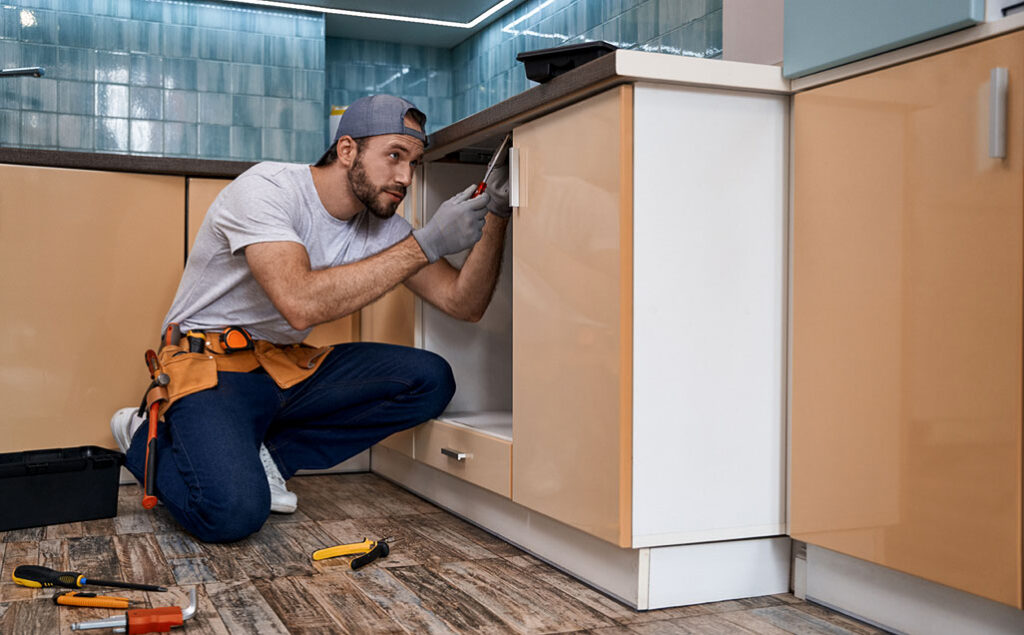
Maintenance include painting, pest control, lawn care and handyman services.
Home Services - Repair
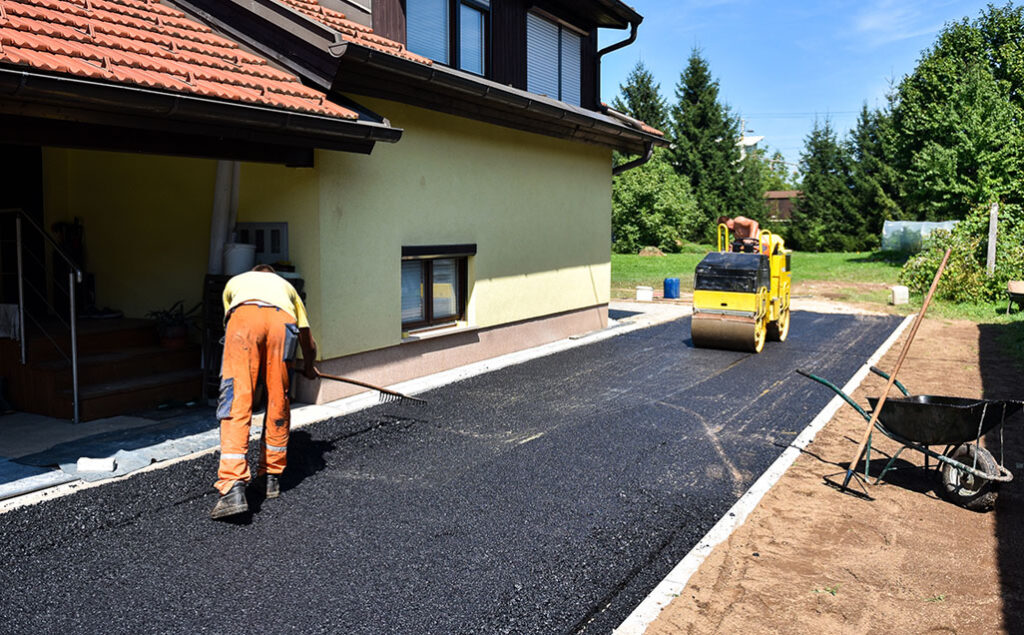
There are franchises to repair cracked driveways, windshields and granite countertops. There are franchises that refurbish front doors and repair tears in leather furniture.
Home Services - Skilled Trades
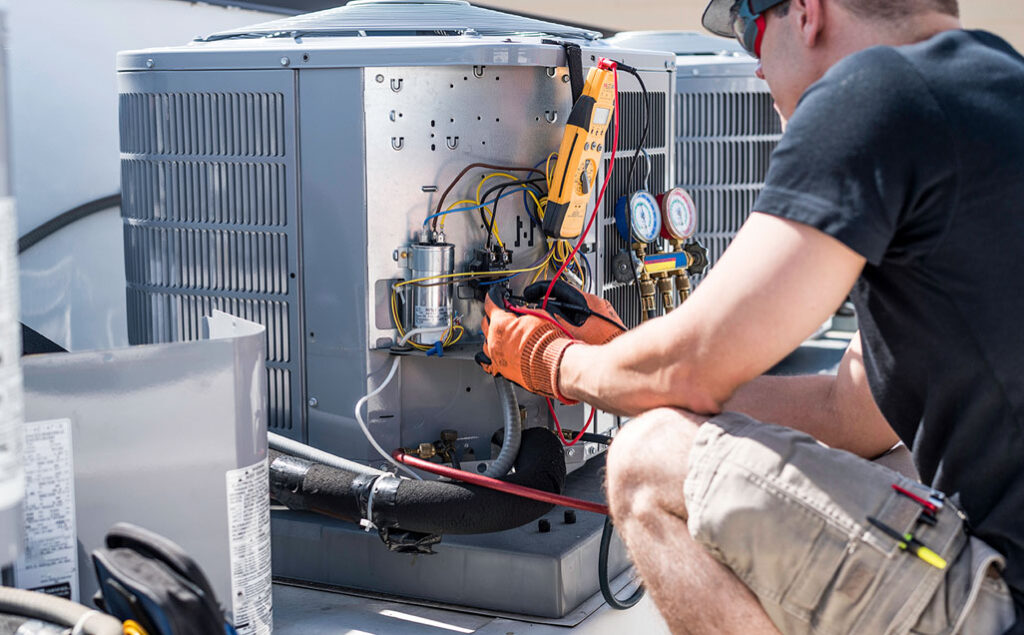
Community Chest

Discovery Meeting – Complete your Discovery Call with your Franchise Coach
- Next Step
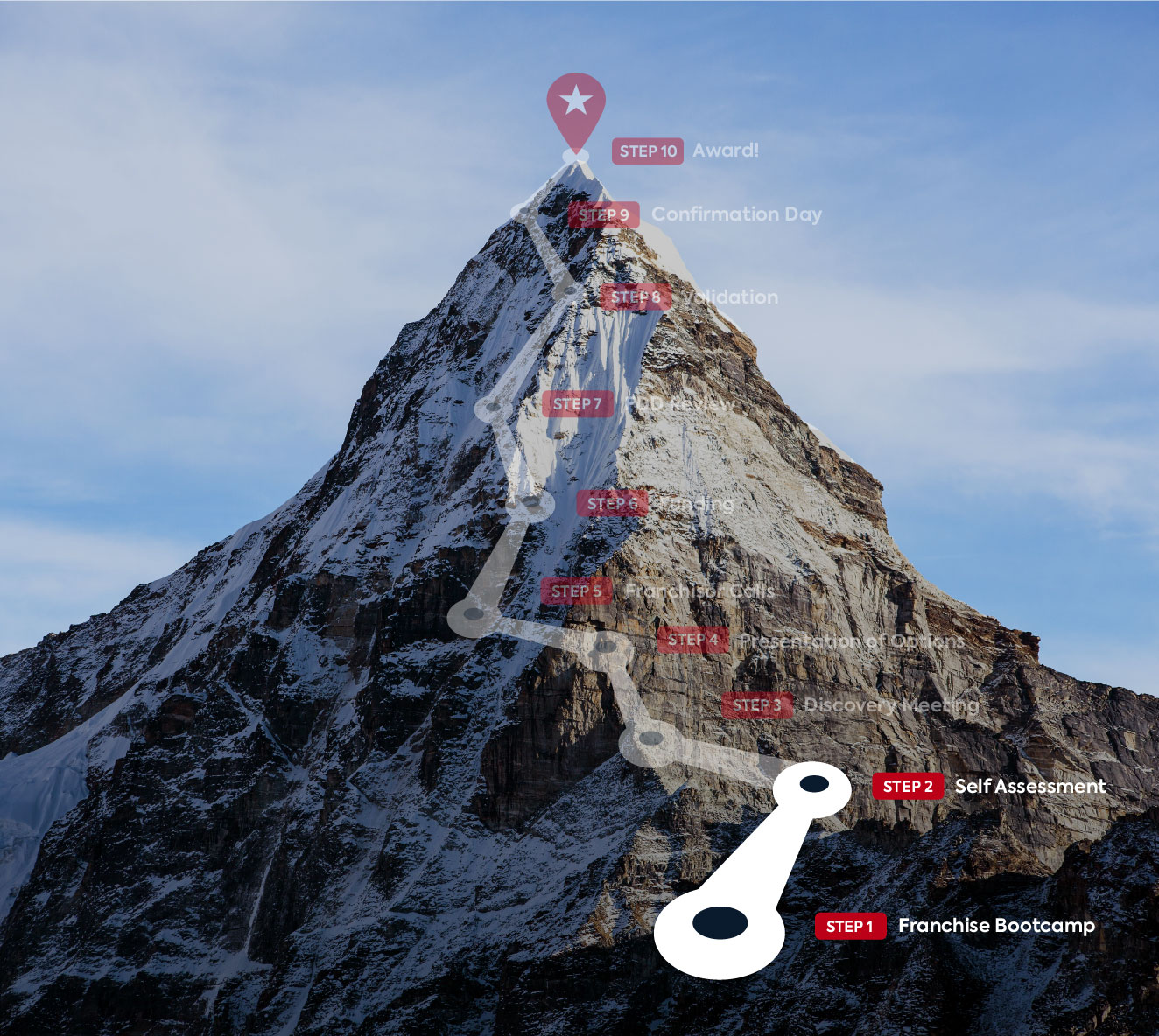
Tasks to Complete
Track your progress by click the “Check Mark” as you complete each task.
-
Task 1
Complete Your Zorakle Profile
Think of this as a fun personality test for business ownership. -
Task 2
Determine Your Net Worth
Use the calculator to help you.
*No information is stored. -
Task 3
Develop Your Industry Preferences
Read through to get a quick synopsis of the most popular industries.
Tasks to Complete
Franchise Glossary

Vetrepreneur.com and Vetrepreneur Franchise Coaching is a private service that is owned and operated by M2V, Inc., a veteran-owned business and is not affiliated with or endorsed by the DoD, the VA or the federal government. Privacy Policy | Terms of Use
Get Social

The appearance of U.S. Department of Defense (DoD) visual information does not imply or constitute DoD endorsement. Vetrepreneur is a veteran-owned business and may receive referral fees from participating franchise partners which enables us to provide our services for free.
